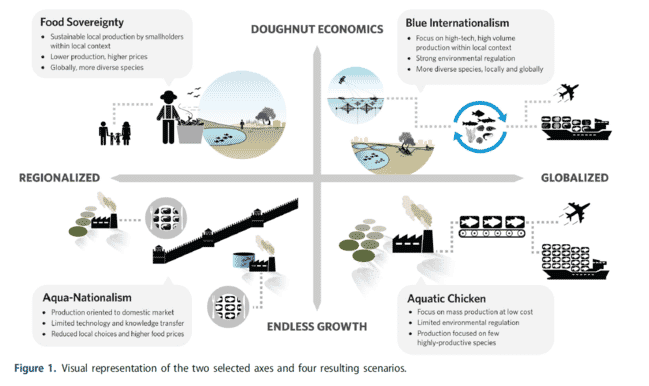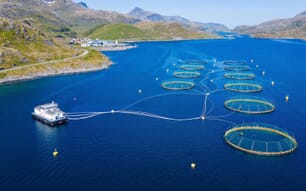
© Gephart et al, 2020
Led by Jessica Gephart, an environmental science professor at American University, the study discusses four different outcomes for the evolution of aquaculture against the backdrop of the Covid-19 pandemic.
“Two dimensions of economic development – the degree of globalization and the predominant economic development philosophy – bound four scenarios representing systems that are either localized or globalized, and orientated toward maximizing sectoral economic growth or to meeting environmental and equity dimensions of sustainability. The potential contribution of aquaculture in improving nutrition security is then evaluated within each scenario,” the authors explain.
Aquatic chickens?
The study offers four distinct future scenarios, each with its own label. "Aquatic chicken" refers to boundless growth in a globalized world; "aqua-nationalism" is a growth-first, nationalistic approach; "food sovereignty" refers to a localised approach; and "blue Internationalism" to a form of sustainable growth in a globalised world.
It is followed by a discussion of the relative opportunities for “nutrition-sensitive aquaculture” – which the authors define as “the adoption of pro-sustainability policies that emphasize achievement of the sustainable development goals and equity of access to healthy, nutritious food” - under each of the scenarios.
The authors argue that, no matter which of the paths the sector takes, targeted policies to promote nutrition-sensitive aquaculture will be required – including initiatives that directly target behaviour change or conditional cash transfer programmes that support homestead food production.
“These types of initiatives have been demonstrated to improve nutrition-sensitive food production systems and would likely lead to improved nutritional outcomes,” they argue.
Sustainability
According to the study, an emphasis on sustainability is the best way to ensure nutrition sensitive production.
“It appears more likely that such commitments will be made and maintained into the future if countries orient their policies toward sustainability than if they prioritize growth, though growth in production could lower prices and make fish more available to all. It is also more likely that such policies will be globally harmonized in a world in which liberal internationalism prevails over nationalist individualism,” they continue.
They also warn of the potential perils of countries becoming too isolated.
“Food sovereignty policies may work in places with capabilities and resources to grow their aquaculture sectors – but an overly rapid retreat from global markets may leave states with nascent or unrealized aquaculture potential behind, to the nutritional detriment of their citizens," they explain.
As a result, they believe that states should "use policies, market instruments, and consumer education to guide development toward more nutrition sensitive and healthy environmental futures".
And they hope that their paper will act as a reference point to "prompt discussion among researchers, policymakers, and advocacy groups about desirable futures for nutrition- sensitive aquaculture to help chart a course for how to get there.”
Further information
The full study, which was published in Reviews in Fisheries Science & Aquaculture, under the title, "Scenarios for Global Aquaculture and Its Role in Human Nutrition", can be accessed here.



